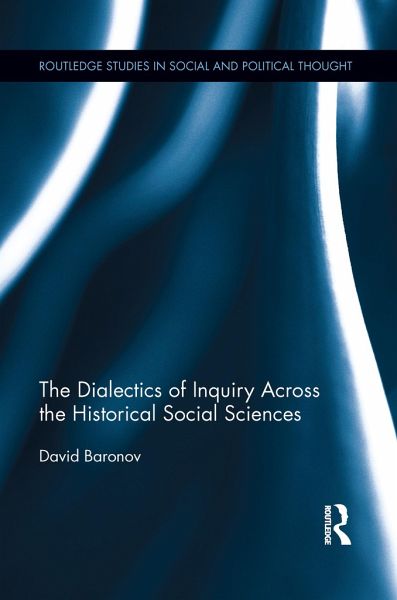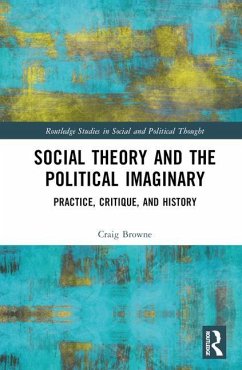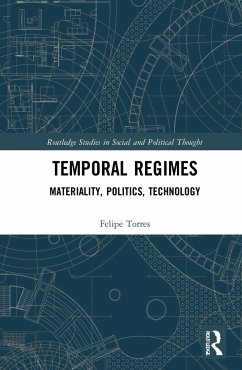David Baronov
Broschiertes Buch
The Dialectics of Inquiry Across the Historical Social Sciences
Versandkostenfrei!
Versandfertig in 6-10 Tagen
Weitere Ausgaben:

PAYBACK Punkte
22 °P sammeln!





This book turns conventional global-historical analysis on its head, demonstrating, first, that local events cannot be derived - logically or historically - from large-scale, global-historical structures and processes and, second, that it is these structures and processes that, in fact, emerge from our analysis of local events.
David Baronov is Professor of Sociology at St. John Fisher College.
Produktdetails
- Routledge Studies in Social and Political Thought
- Verlag: Routledge / Taylor & Francis
- Seitenzahl: 332
- Erscheinungstermin: 12. Oktober 2015
- Englisch
- Abmessung: 229mm x 152mm x 18mm
- Gewicht: 453g
- ISBN-13: 9781138957381
- ISBN-10: 1138957380
- Artikelnr.: 43859265
Herstellerkennzeichnung
Libri GmbH
Europaallee 1
36244 Bad Hersfeld
gpsr@libri.de
"An enormously ambitious and wide-ranging work which cuts across traditional and conventional academic subject divisions. It develops a large and important argument which constitutes a significant original contribution to social theory. Clear and readable. Highly recommended to anyone interested in critical social thought."
- Sean Sayers, Professor of Philosophy at the University of Kent, author of Marx and Alienation: Essays on Hegelian Themes
"The current world-wide transformations from Egypt to Bolivia demand that we revisit the old debates on the global and the local with a renewed urgency. This is precisely the task that David Baronov's Dialectics of Inquiry takes on. Baronov
- Sean Sayers, Professor of Philosophy at the University of Kent, author of Marx and Alienation: Essays on Hegelian Themes
"The current world-wide transformations from Egypt to Bolivia demand that we revisit the old debates on the global and the local with a renewed urgency. This is precisely the task that David Baronov's Dialectics of Inquiry takes on. Baronov
Mehr anzeigen
inflects the global/local debate with concepts in the historical social sciences ranging from Hegel to contemporary post-structuralism. Looking at wide ranging sites ranging from the 1863 Draft Riots in New York to the AIDS crisis in Mozambique, Dialectics of Inquiry powerfully and lucidly argues that the local 'event' in fact reconstitutes large scale social change. This is a book that will contribute immensely to our understanding of the historical social sciences, and will be of great value to scholars and graduate students."
- Ravi Sundaram, Senior Fellow at the Centre for the Study of Developing Societies, Delhi, India, author of Pirate Modernity: Delhi's Media Urbanism
"David Baronov's keen insight to the debate over structural determinism versus agency is nothing more than an invitation into the other salient debates of our time, including particularism versus universalism, idiographic versus nomothetic, science versus humanities, modernism versus postmodernism, the global versus the local, and historicism versus radical contingency. This well crafted analysis, while focusing on very particular historical events, will prove to be useful to a large variety of scholars. Social theorists of many persuasions will enjoy the texts handling of a mixed variety of intellectuals. Researchers across historical sociology, especially within world-system's analysis, will benefit from the imaginative ways the text overcomes the debate of holism versus particularism. And historians and anthropologists who are interested in thick and deep narratives will find that they too can have their cake and eat it while gaining an appetite for a structuralist entree."
- Khaldoun Samman, Associate Professor of Sociology at Macalester College, author of The Clash of Modernities: The Islamist Challenge to Jewish, Turkish, and Arab Nationalism
"Baronov's work is critical for capturing the dialectic of the historical subject within long-term, large-scale historical accounts which remains a profound dilemma for historical sociology today. As Baronov has so eloquently captured it, his study not only tells, but also shows, how one can foster a dialectical method that places human agency at the heart of long-term, large-scale history making."
- Mohammad H. Tamdgidi, Associate Professor of Sociology, UMass Boston, author of Advancing Utopistics: The Three Component Parts and Errors of Marxism
"Baronov develops a highly innovative angle of vision that cuts the Gordian knot of the historical social sciences. His creative use of concrete historical instances to reposition basic precepts within historical sociology provides historical social science with a radical new conceptual landscape for analysis. He overturns many basic assumptions and opens promising new avenues supplanting the categorical opposition and enigmatic relation of structural determinism and individual agency with a dynamic, reflexive understanding."
- Mehretab Abye Assefa, Associate Professor of Sociology at St. Lawrence University
"A work of comprehensive originality"
- Marx & Philosophy Review of Books
- Ravi Sundaram, Senior Fellow at the Centre for the Study of Developing Societies, Delhi, India, author of Pirate Modernity: Delhi's Media Urbanism
"David Baronov's keen insight to the debate over structural determinism versus agency is nothing more than an invitation into the other salient debates of our time, including particularism versus universalism, idiographic versus nomothetic, science versus humanities, modernism versus postmodernism, the global versus the local, and historicism versus radical contingency. This well crafted analysis, while focusing on very particular historical events, will prove to be useful to a large variety of scholars. Social theorists of many persuasions will enjoy the texts handling of a mixed variety of intellectuals. Researchers across historical sociology, especially within world-system's analysis, will benefit from the imaginative ways the text overcomes the debate of holism versus particularism. And historians and anthropologists who are interested in thick and deep narratives will find that they too can have their cake and eat it while gaining an appetite for a structuralist entree."
- Khaldoun Samman, Associate Professor of Sociology at Macalester College, author of The Clash of Modernities: The Islamist Challenge to Jewish, Turkish, and Arab Nationalism
"Baronov's work is critical for capturing the dialectic of the historical subject within long-term, large-scale historical accounts which remains a profound dilemma for historical sociology today. As Baronov has so eloquently captured it, his study not only tells, but also shows, how one can foster a dialectical method that places human agency at the heart of long-term, large-scale history making."
- Mohammad H. Tamdgidi, Associate Professor of Sociology, UMass Boston, author of Advancing Utopistics: The Three Component Parts and Errors of Marxism
"Baronov develops a highly innovative angle of vision that cuts the Gordian knot of the historical social sciences. His creative use of concrete historical instances to reposition basic precepts within historical sociology provides historical social science with a radical new conceptual landscape for analysis. He overturns many basic assumptions and opens promising new avenues supplanting the categorical opposition and enigmatic relation of structural determinism and individual agency with a dynamic, reflexive understanding."
- Mehretab Abye Assefa, Associate Professor of Sociology at St. Lawrence University
"A work of comprehensive originality"
- Marx & Philosophy Review of Books
Schließen
Für dieses Produkt wurde noch keine Bewertung abgegeben. Wir würden uns sehr freuen, wenn du die erste Bewertung schreibst!
Eine Bewertung schreiben
Eine Bewertung schreiben
Andere Kunden interessierten sich für














